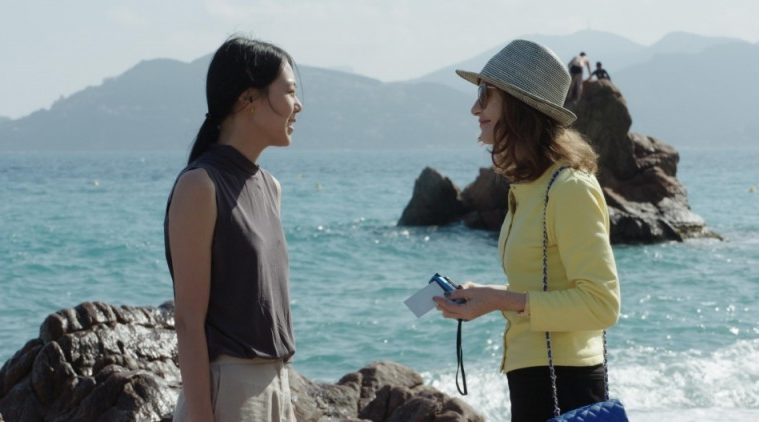
A limited-perspective snapshot of a perpetually moving target, and insistent on adhering to 2018 theatrical premieres — thus haunted both by the past and the specter of already-seen “2019” cinema that deserves notice as much as anything herein. Or: it is what it is.
Honorable Mentions
Mandy, A Star Is Born, Cold War, Mission: Impossible – Fallout, The Wandering Soap Opera
10. 24 Frames (Abbas Kiarostami)

A push-pull experience par excellence: plainly beautiful for its still and natural landscapes, roughshod with the superimposition of effects; statically framed but open to variables, experimentation, “accidents” that are perhaps part of a larger plan, depending on what production story you buy; and thrilling for the breadth of its imagination while also a bit boring in the follow-through. More and more it seems our minds need opportunities to sit, wander, think for themselves amidst stimuli rendering the likes of 24 Frames all the more far-flung. Woe betide the audience saddled with the closing statement of a master filmmaker – arguably the greatest living in his time – but look and listen to its very end. Could anything else have said it more finely?
9. Let the Sunshine In (Claire Denis)

This great, difficult, imposing, sometimes outright-off-putting director’s breeziest (only breezy?) film is her most immediately enjoyable because she made it — its sensuousness, its sadness, its pinpoint-precise sense of humor — look easy. Which, as if it needs to be said, is a feature and not a bug.
8. The Green Fog (Guy Maddin, Evan Johnson, & Galen Johnson)

I might have fallen asleep for some of this, but had you projected it again then and there I almost certainly couldn’t tell you when. Best seen with a friend who understands exactly why it’s funny that Guy Maddin watched Terminator Genisys.
7. John McEnroe: In the Realm of Perfection (Julien Faraut)

Would deserve commendation had it merely documented the obvious visual and sonic beauty intrinsic to professional tennis; what a pleasure to bask in. But that’s finally window-dressing for the thorough study of something I can’t say occupies my mind so often: physical genius.
6. The Mule (Clint Eastwood)

I Went to See an 88-Year-Old Actor-Director Grind on Scantily Clad Women Generations His Junior and All I Got Was This Measured Statement on Contemporary America, Its Institutions, and Its People.
5. Before We Vanish (Kiyoshi Kurosawa)

Consensus-best is, of course, a horrible metric, yet it’s only sensible that Kiyoshi Kurosawa’s Before We Vanish is his consensus-best (but absolutely not his only worthwhile endeavor) since 2008’s Tokyo Sonata: within its ever-liquid widescreen walls are a familiar-while-surprising angle on the alien-invasion film — mechanics hardly explained, dangers perpetually felt. More credit for skirting emphasis on some what-it-means-to-be-human angle that hobbles many of its ilk. Is the deepest thing under Before We Vanish‘s skin love? Of course not.
4. First Reformed (Paul Schrader)

It’s not about climate change, it’s about PTSD.
3. A Paris Education (Jean-Paul Civeyrac)

A promise: those who’ve gone this deep will find pleasure — masochistic, cringe-inducing, subject-me-to-more-please pleasure — in A Paris Education. The most giggle-inducing laceration of myopic cinephilia in quite some time (I could point only to an argument about Fincher and Verhoeven vs Ford and Vigo and leave it at that) is a great tale of bozos in their many forms — first comic, then tragic, and finally as a semi-stable state of contentment, deserved or otherwise. Civeyrac’s brilliance stands one-to-one with his idea: to watch this, something about which its all-too-real-seeming figures would debate in a perfectly attenuated shot-reverse dynamic, is to feel you’re within its confines. Not that I’d been unfamiliar at the start, or am leaving anytime soon.
2. Claire’s Camera / The Day After (Hong Sangsoo)

Having only experienced Hong Sangsoo’s filmography chronologically, there’s the impression of these (which premiered within days of each other) as a logical one-before-the-next step: we start bright, sunny, funny, quiet plot machinations and possible (but not definite) structural oddities twisting us out of a clear time-space continuum, at last settling into the groove of life’s unforgiving shape; and then a deep, dark ebb from which color and life are drained, our mistakes coming back to us in a feedback loop. But the pleasures never cease. Hong’s scenarios are still so remarkably thought-through–for distance between us and the subject, the presences people communicate, body language as the universal dialect, and why the hardest failures, on a long-enough timeline, might inch us towards salvation. I hope he never stops, and he’s got at least one more great film coming in 2019.
1. Lover for a Day (Philippe Garrel)

Every month that has passed since the frigid, solitary Saturday night on which Lover for a Day was viewed constitutes an argument for letting this stand unreturned-to. Garrel has spent half a century telling us we are nothing if not immensely complicated; what a gift that this may be watched in the time it takes most other films to develop a worthwhile image and idea.
“What did you talk about with your friends?”
“The war.”
“Which one?”
“The next one.”
Continue: The Film Stage’s Top 50 Films of 2018


